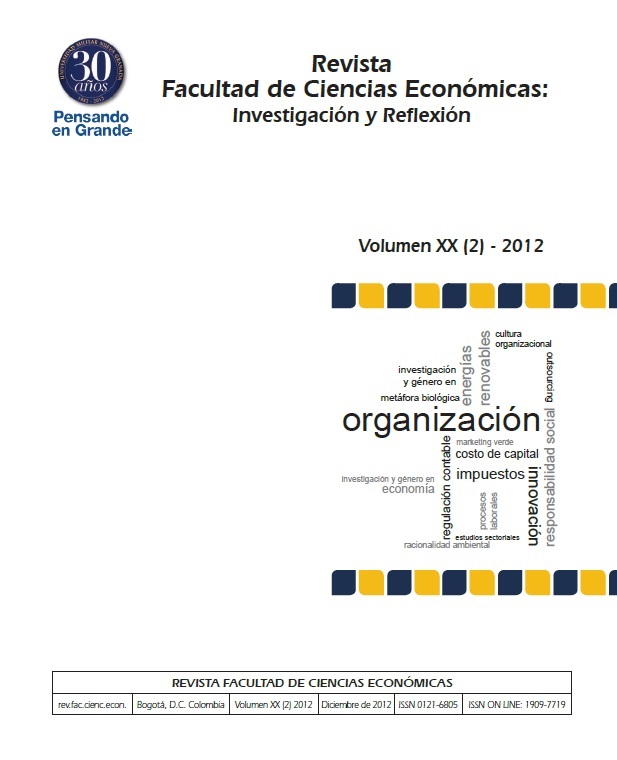Problemas contemporáneos en outsourcing: los sistemas de información contable y de gestión
Resumen
En años recientes, el outsourcing se ha venido convirtiendo en una tendencia tanto en empresas de Europa y los Estados Unidos. Ni siquiera, trabajadores muy calificados se salvan de este asalto. La vanidad de los intelectuales y los profesionales que ejecutan tanto sistemas de información contable (AIS), como sistemas de información de gestión (MIS) es su creencia de que están exentos de estos procesos de outsourcing. Algunos creen que disfrutan de una vida de ensueño, que la demanda de sus servicios está asegurada. Se consuelan pensando que el aumento de su dominio técnico les ofrece una defensa suficiente contra los ataques provenientes del mercado laboral y de productos. Una interpretación desde los estudios críticos indicará que esta posición es un acto de arrogancia, siendo esto el eje de la discusión de este documento. Tal actitud de los profesionales contables es una reminiscencia del Rey Canuto esperando que la marea retroceda.
Descargas
Lenguajes:
enReferencias bibliográficas
Allen, V. (1975) Social analysis: a Marxist critique and alternative. Harlow: Longmans.
Arnold, V. & Sutton, S. (2002) (eds). Information Systems Research. American Accounting Association, Information Systems Section
Arnold, V. & Sutton, S.G. (1993) Order and Receny Effects in Complex Decision Making: Implications for the Design of Audit-Oriented IDSS. American Accounting Association Annual Meeting, San Francisco, August.
Aronowitz, S. (2000)The knowledge factory: dismantling the corporate university and creating true higher education. Boston: Beacon Press.
Aronowitz, S. & Difazio, W. (1994) The jobless future: sci-tech and the dogma of work. Minneapolis: University of Minnesota Press.
Baritz, L. (1960)The servants of power: a history of the use of social science in american industry. New York: John Wiley & Sons.
Bowles, S. (1972) Unequal Education and the Reproduction ofthe Social Division of Labor.Carnoy, M. (ed). Schooling and Corporate Society: Political Economy of Education in America David McKay.
Braverman, H. (1998) Labor and monopoly capital: the degradation of work in the twentieth century. 25th Year Anniversary Edition, New York: Monthly Review Press.
Burawoy, M. (1985) The politics of production. London: Verso.
Burawoy, M.(1979) Manufacturing Consent Chicago University of Chicago Press.
Cleaver, H. (1979) Reading capital politically. University of Texas Press: Austin Texas.
Dobb, M. (1937) Political economy and capitalism: some essays in economic tradition. Routledge and Kegan Paul, London.
Dobb, M. (1973) Theories of value and income distribution since Adam Smith: ideology and economic theory. Cambridge: Cambridge University Press.
Edwards, R. (1979) Contested terrain: the transformation of the workplace in the twentieth century. London: Heinemann.
Frederick, T. (1967) The principles of scientific management. New York.
Galbraith, J. (2000) How the Economists got it wrong. The American Prospect, February.
Galbraith, J. (2009) Who are these Economists Anyway? Thought and Action: The NEA Higher Education Journal, 25, Fall.
Gamble, A. & Walton, P (1976)Capitalism in crisis: inflation and the state. London: The Macmillan Press Ltd.
Gintis, H. (1972)Towards a political economy of education: a radical critique of Ivan Illich'sdeschooling society. Harvard Educational Review, 42 (1): 70-96.
Goldstein, F (2008)Low-wage capitalism: colossus with feet of clay: what the new globalized high-tech imperialism means for the class struggle in the U.S. New York: World View Forum.
Gorry, G., & Scott Morton, M. (1971)A Framework for Management Information System. Sloan Management Review, Fall: 55-70.
Hammond, M. & Champy, J. (1993) Reengineering the corporation: a manifesto for business revolution. New York: Harper Business.
Harvey, D. (1989) The condition of post-modernity. Oxford: Blackwell.
Jameson, F. (1991) Postmodernism: or, the cultural logic of late capitalism. London: Verso.
Karier, C. (1977) Business Values and the Educational State. Reprinted in Schooling and Capitalism ed. by Dale, Rogers; GeogEsland and Madeleine MacDonald, Routledge&Kegan Paul, London and Henley.
Keen, P & Scott Morton, M (1978) Decision support systems: an organizational perspective. Reading, MA: Addison-Wesley.
Kraft, P. (1979) Programmers and managers: the routinizationof computer programming in the United States. New York: Springer Verlag.
Krugman, P (2009) How did Economists get it so wrong. New York Times, Sunday Magazine, September.
Kuhn, T. (1962) The Historical Structure of Scientific Discovery. Science, 36: 760-4.
Kuhn, T. (1970) The Structure of Scientific Revolutions. Second Edition, Chicago: University of Chicago Press.
Marcuse, H. (1964) One-dimensional man: studies in the ideology of advanced society. Routledge&Kegan Paul.
Mason, R. (1986) Four ethical issues of the information age. MIS Quarterly, March.
Pollard, S. (1965) The genesis of modern management: a study of the industrial revolution in Great Britain. London: Edward Arnold.
Scott Morton, M. (1974) The State of the Art of Research. McFarlan, F.W. (Ed.)The information systems research challenge. Boston: Harvard Business School Press.
Shaw, M. (1975) Marxism and social science: the roots of social knowledge. Pluto Press, London.
Stone, I. (1989) The Trial of Socrates. New York, Knopf Doubleday Publishing Group.
Sutton, S., Arnold, V. & Arnold, T. (1995) Toward an understanding of the philosophical foundations for ethical development of audit expert systems. Research on Accounting Ethics, 1: 61-74.
Tinker, T. (2001) AAA.Inc. Critical Perspectives on Accounting, Vol. 12 (2), April.
Tinker, T. (1977)Sighting the accounting problematic: towards and intellectual emancipation of accounting. Journal of Business Finance and Accounting, (with E.A.Lowe), 4 (3): 263-276.
Tinker, T. & Feknous, B. (2003) The politics of the new courseware: resisting the real subsumption of asynchronous educational technology. The International Journal of Accounting Information Systems, 4: 141-64.












